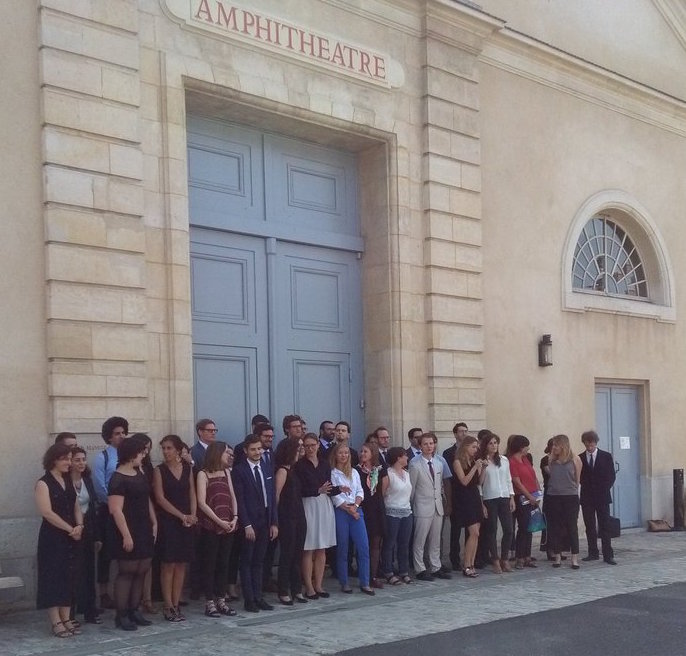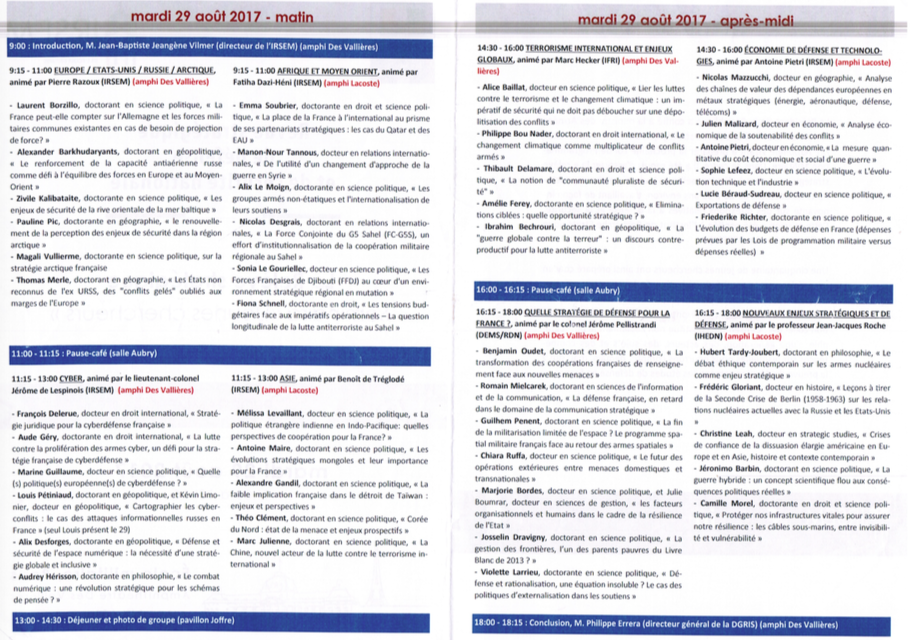The French strategic succession in breakdown of European reflection?

(B2 in Paris) This Tuesday was held in Paris, within the military school, a very interesting exercise. The young flower of French strategic thought came to present its work under the leadership of IRSEM, the research institute. About fifty researchers (as numerous as their male counterparts) who had 10 minutes (no more) to present the results of their research, their thesis (in the process of being written or almost finished).
From Russia (which has been the subject of many points of view) to Mali, via North Korea, the Arctic, terrorism, climate change, Djibouti, Mongolia, Syria, the G5 Sahel, Taiwan, India's defense policy, the French defense budget, etc. The reflection panel was wide. And the new faces of this budding thought deserve (just as much as the old ones) to find their way to TV, radio and newspaper pages because the points of view they develop are very interesting.
However, I have a small flat to bring to this enthusiasm. A regret. Surprisingly, no work was devoted to the European Union, to new cooperation projects, to the role of the High Representative... An inexplicable impasse, unexplained moreover. Of course, the European Union was mentioned many times (from what I was able to hear) in terms of its political position on Korea, or sanctions, funding for Mali, the fight against terrorism, and so on. The mention was recurrent. But it was not the subject of any proper study. Even expanding to include European countries, I have only identified one work, that of Laurent Borzillo on Germany, with an oh-so-relevant question: "Can we count on [Berlin] and the common military forces existing in the event of the need for force projection? ".
Nothing on Brexit, on the military or industrial capabilities of such a European country, on the shock of the financial crises on the countries of southern Europe, on the possible (or impossible) European projects, on the maritime operations of the EU , on cooperation (structured, reinforced, etc.),... Neither in explanatory mode nor in critical mode or quite simply prospective. A poverty which is undoubtedly due to the chance availability of students. But not only. We had already noted this when writing our book on the CSDP: as many student works were in the French-speaking world in the years 2000 to 2010 on the missions, the instruments of the CSDP, etc. as much they are rarer today.
Does this reflect a more general position? To follow closely. But today there is a certain disenchantment, a fairly widespread French tropism in the military ranks, to consider Europe as a problem rather than a solution, at least in terms of defense (a little less security). We seem to prefer exotic, distant subjects, rather than trying to get to know and cooperate better with neighbors, who are considered inefficient, not very enterprising and poorly endowed. Everyone swears by the British who remain for the French the alpha and omega of European defence. Which seems like a (beautiful) political decoy.
This ignorance in the field of reflection is rather surprising at a time when, precisely, defense has burst into the European political field at the highest level. Significant developments are underway. Not a day goes by today in Brussels, in Paris et in the other European capitals where this subject is not mentioned, discussed, debated. Europe has (finally) broken certain taboos by agreeing to finance defense projects and it will certainly be one of the key points of the current strategic review. Emmanuel Macron has made European reform one of his axes of government.
Defense Europe suffers from multiple shortcomings, of course. Europeans can sometimes appear pusillanimous, no doubt. This does not detract from the importance of knowing the resources and shortcomings of our neighbors well in order to be able to interact with them, to grasp more precisely the power games in progress in the corridors of Europe in order to have a capacity to influence and bring grain of salt in this maelstrom.
(Nicolas Gros-Verheyde)




Excellent remarks… The traditional French tropism is undoubtedly reinforced by the European crisis, for which the current responses are very probably insufficient and the leadership failing. It remains to be seen whether Macron's projects for European reform will be more mobilizing or whether, as for immigration, posted workers or, who knows, defence, they will always bypass Brussels. No wonder, then, that the attention of researchers and analysts is focusing a little more on France...
Amazing indeed. Undoubtedly the influence and the place of the Anglo-Saxon doctrine, more and better disseminated in the academic and professional (military) world. Perhaps also the fact of the absence of diplomatic or military crises within and in the immediate neighborhood of the EU. Finally, a certain weariness in front of the slowness/heaviness of the politico-administrative process of construction of a European defence. You don't fall in love with a “permanent structured cooperation”… JGG
Thank you for this interesting reaction and this judicious remark.
Indeed, French strategists have forgotten to take an interest in the PeSDC when it was their focal point, when nearly twenty years ago people dreamed of “European defence” (French style). Since the NATO normalization of France, and its return to the Atlantic rank in two five-year terms, strategic tensions have, seen from Paris, deserted the EU to be dealt with in NATO and with its guns, and this all the more that the Arab Spring and the questions of jihadism and associated migrations have focused the attention of French researchers elsewhere. As for the Ukrainian, Syrian and now Turkish affairs, they have been handled differently, without any real reference and even less recourse to the EU seen as Washington's geostrategic trailer.
Very few researchers in France today see in Brexit an opportunity to relaunch a European security project as the military sluggishness of the 27 borders on strategic resignation. The spell is broken and the French are looking for other partners. As for the strategic procedural mechanics of the EU, it is struggling to convince 17 years after Helsinki, its headline goal and its ambitious toolbox! The bureaucracy was the strongest. Moreover, the French elites have deserted the positions of responsibility of the PeCSD as of the Pesc. Many also think that the geopolitical format of the 27 no longer has any strategic or military meaning and pleads for other European postures that are smaller or larger, it depends (see the work of La Vigie).
A final word on the young researchers in strategic matters, I find, like many, very strange that one does not find in this aeropagus of young shoots gathered by Irsem any soldier, whereas the officers of the School of war devote a good year to operational and strategic retraining and produce very interesting studies on these subjects which concern them in the first place. What about young military researchers?
JD
As a speaker on a panel which I believe you attended, I take the liberty of emphasizing that if my reflection did not bear directly on the CFSP, I underlined how much Europe was absent in resolving the conflicts of its neighborhood, with a foreign policy which is still not very audible despite the function of High Representative (the expression of Minister for Foreign Affairs having fallen by the wayside) and the division of its member states.
The question of the EU was also mentioned in the panel on cyberdefence, as well as on terrorism, i.e. in the 3 panels I was able to attend.
Thank you for your comment. You are absolutely right, the EU has been mentioned several times, evoked (which I think I have clarified). But, it is probably not to you that I will learn that "talking about is not searching"... On the merits, "a foreign policy not very audible", allow me to have an opinion, a little more shade. On the neighborhood, precisely the EU has some assets that it exploits (probably not enough yet, that's for sure). As for the fact that the High Representative is not called Minister, he has very little influence in practice, the HR having received all the functions (except the name) which would have been devolved to what would have been was the EU Foreign Minister. One can have a nostalgia for the term 'Minister', on reflection, I personally prefer that of High Representative which corresponds more exactly to the real functions of this 'Minister' who does not have the power to impose on the States to change their foreign policy, but more to be the spokesperson, the coordinator, the driving force behind “these” policies. This is the European reality: there is not one foreign policy but 28 + 1. The EU is strong when it has a fairly united policy (eg Georgia, Tunisia), + weak when it is divided (Libya, Israel/Palestine, Syria)…despite the appearance of unity.